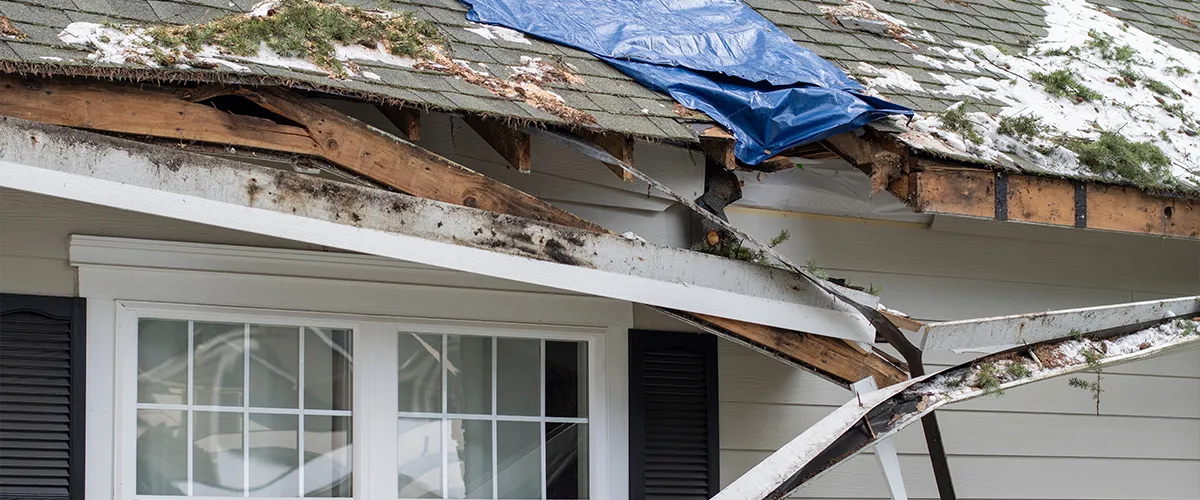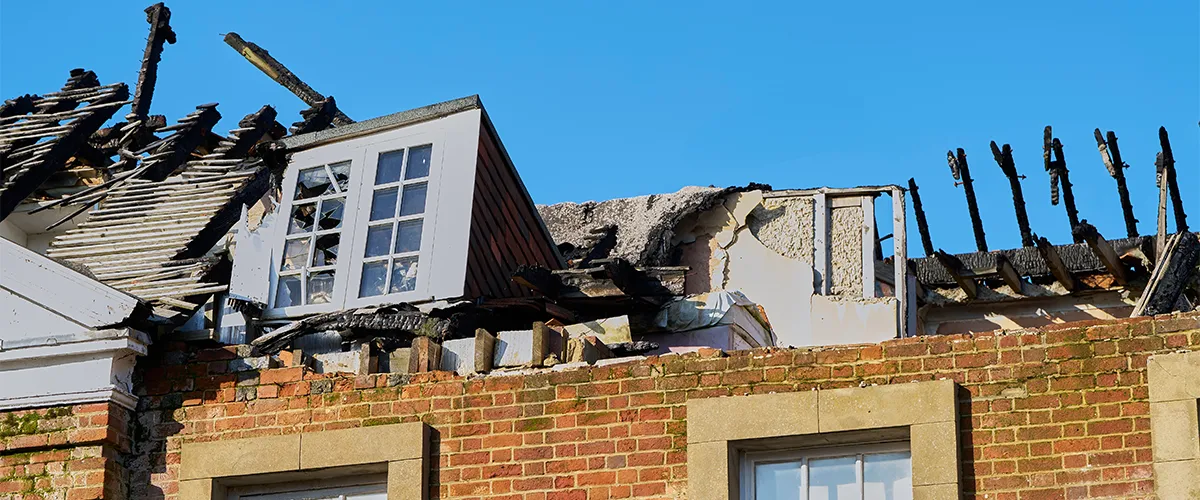While reading this, please keep in mind a crucial thing: your potential clients through insurance claims have just gone through a disaster. They’re at a low point and the last thing you want to do is take advantage of the situation. Show compassion and care so you don’t damage your company’s image.
Did you know that wind and hail caused over 40% of home insurance claims in 2022? Water damage and freezing caused over 25%, and fires over 20% of peril claims as well.
These disasters are straight-up awful, but people still need to recover and restore their homes…
Which gives you the chance to get insurance jobs as a contractor.
A quick disclaimer: working with insurance companies and agents is either great or horrible, and I’ll tell you why.
How To Get Work With Insurance Agents & Companies
I won’t sugar coat this.
Most contractors who work with insurance contracts know them on a personal level.
It’s all about connections and phone numbers, and if you don’t have these…
Starting to work with insurance agents and companies is hard.
There are requirements you need to meet.
You’ll need a lot of connections.
You’ll need to have a proven track record of excellent customer service and craftsmanship.
And you need a lot of patience.
Insurance companies also have their own way of vetting contractors, so you’ll need to check off all the boxes to ensure you qualify.
Two of the best ways to get insurance claims projects is to talk either with insurance agents or with mitigation companies that don’t do the repair. Ask for referrals, show them your work, and you can start building a relationship from there.
Let’s see some of the most important requirements you need to meet to get into the most popular insurance company programs.
Conditions Your Business Need To Meet
- You need to be in business for more than a year.
- You need to make over $1M in revenue.
- You need to have wrapped trucks (most require at least 2)
- You need various certifications like IICRC and HAAG
- You need to be licensed, insured, and bonded.
- You need to have a software license for Xactimate (app for estimating that many insurance companies rely on)
- You need a deep understanding of the building codes in your area.
- You need access to vendor programs like State Farm’s Premier Service Program or Allstate’s Managed Repair Network.
- And more, depending on the insurance company.
Being on the ‘preferred list’ of contractors for insurance companies is like having a lead-generation machine that’s continuously bringing in cash.
A preferred contractor is someone who gets the first dibs on insurance claim jobs. It is someone that insurance agents and carrier recommend first. And it is someone that makes a lot of money from insurance jobs.
Here’s how to become the preferred contractor for agents, carriers, and homeowners.
#1 Learn How To Negotiate
You need to understand that in this whole process, everyone has a goal.
The homeowner wants to get as much money as possible from his insurance carrier, the agent wants to give as little money as possible, and you, the contractor, wants to make the job worth your time.
So, learn to negotiate with the agent, make him understand the job and the real scope of work, and you should be good.
#2 Understand the process
Many contractors on the preferred list have entire teams for insurance claims simply because the process is tedious.
The process is fairly tedious and require time, which is why it’s best to have someone to work exclusively with insurance adjusters and overseeing the claims process.
#3 Provide a Stellar Service
Get a clean track record for all restoration jobs that you do. Make sure you make the process easy for the homeowner, offer your best advice and help, be transparent about the pricing and simply be there for them.
As long as you have great feedback from the homeowner and the agent, you’ll get on the preferred list easily.
#4 Invest in growth and skills
Make sure to stay up to date with the latest trends in the construction industry. Take courses, train your team, buy newer tools, invest in marketing, and so on.
At the end of the day, the insurance company and the agent want the homeowner to be happy, and as the contractor performing the restoration, you play a big part in his satisfaction.
#5 Learn using Xactimate or Symbility
Most, if not all insurance companies use these two tools: Xactimate and Symbility.
Both are a professional estimating tool used primarily in the insurance restoration and construction industry to calculate the cost of repairs and rebuilding after like fires, floods, storms, or other insurance claims.
Both have strengths and weaknesses, so do your research and pick the one best for you.
Knowing these two programs greatly increases or decreases your job revenue.
Pros And Cons Of Getting Jobs From Insurance Companies
After hearing the stories of hundreds of contractors that do insurance claims jobs, I noticed there are more cons than pros.
I’m sure some of them don’t happen with every insurance company, but I think it’s fair to show you both sides of the story.
| Pros | Cons |
| Steady business (when you have a solid reputation) | Insurance companies will prefer lower costs than quality work |
| You’ll always get paid | Adjusters don’t know the real scope of work |
| Simplified payments | Adding a third party (the insurance company) slows down the process |
| Networking opportunities | The insurance company is usually the one dictating the price |
| Builds credibility and trust | Hard to make a good profit from insurance claims uneless you estimate properly |
| Can make good money if you have a foot in with the carrier and adjuster | You need a lot of connections to get on the ‘preferred list’ of vendors |
| - | Sometimes companies require heavy documentation to get insurance jobs |
| - | Avoid TPA work at all costs, it is time-consuming and frustrating |
What Are The Best Services To Offer For Insurance Claims?
The thing with insurance claims is that not all of them are as lucrative as you’d want. Even if you want to help, you’re still a business and you need to pay your employees.
That being said, you can’t take an insurance job that’s just $5,000 when the real cost should be well over $10,000.
You need to determine what’s the best service to offer, and these are some pointers to help you out…
Considering wind damage accounts for ¼ of all insurance claims, roofing and siding companies are the most lucrative when it comes to insurance claims.
Plumbing is also a popular peril for claims, as water damage and freezing account for a bit over 25% of claims.
You can also offer remodeling services for fire and lighting damages, as these perils make up to 22% of all claims.
There’s also another thing to consider, and that is the occurrence of these perils. Storms and hurricanes are frequent in Florida, but not so much in California. You know best what’s going to be the most lucrative service to offer for insurance claims.
So, Is It Worth Trying To Close More Insurance Jobs?
Everyone says the insurance gravy train went over the cliff years ago.
And I can’t fight dozens of contractors who say the same things…
- “They want to pay like your a hobo who needs work.”
- “Working with insurance companies is a total offshoot to the construction industry.”
- “It can be amazing with a good adjuster, or sheer hell with a bad one.”
- “Run. Insurance is terrible.“
- “I HATE insurance claim jobs. Generally won't even consider them.”
- “Had a buddy do a couple claim jobs. Never again. It's worse than working for production builds.”
But the reality is this…
Some people made it work when they understood the depths of the industry, and you can too!
How Else Can I Grow My Business?
While it’s true that clinging yourself to a multi-billion dollar business like an insurance company sounds profitable, that’s not always accurate.
You can find your own projects to work on, make a lot more money, and eliminate a lot of friction and frustration.
A lot of other contractors have been doing this for a long time, and it’s simple.
Capture and create more demand for your service online.
You just need a partner to help you navigate the online marketing world and help you make money on your own.
We help contractors get high-value leads and go past their revenue goals without all the hassle and frustrations of small insurance jobs.
If you’re interested in learning more, click the button below to start a conversation.
FAQ
Can I do insurance claims jobs with 1099 workers or internal employees?
Both. There are some legal intricacies to these and it’s best to talk with your accountant or a legal advisor about this. From what we’ve seen in the industry, you can have your employees handle the insurance job and you can be a 1099 for an insurance contractor.
Where can I get a good adjuster?
Now this is a real good question, because adjusters will ALWAYS have the biggest impact on how much you’ll be paid.
Generally, you’ll want to work with someone who understands your trade and the real scope of work. You want someone who can see reason and someone who you can easily talk to. Otherwise, an adjuster who’s 100% certain that a sheet of drywall is $5 will cause a lot of frustration.
What’s the average insurance payout for various claims?
The average payout for fire-related insurance claims averages around $77,340.
The average payout for water-related claims averages around $11,650.
The average payout for wind-related claims averages around $12,913.
What are the states where insurance claims projects are the most lucrative?
Generally, wherever the average yearly premium is the highest, that’s where you know there’s a lot of insurance claims.
Some of the states where insurance claims projects are very frequent are Florida, Louisiana, Oklahoma, Texas, Colorado, and California.



